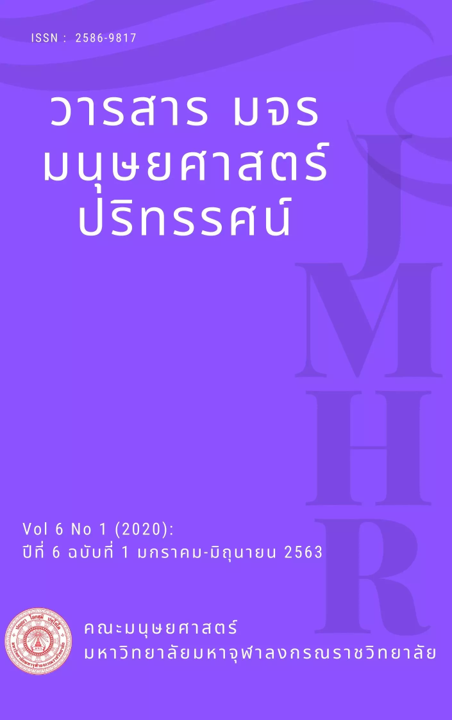ประสบการณ์ทางจิตใจของนักเรียนชั้นมัธยมศึกษาตอนต้นที่มีการเห็นคุณค่าในตนเองเพิ่มขึ้นหลังการเข้าร่วมกลุ่มพัฒนาตนร่วมกับการทำสวน
คำสำคัญ:
กลุ่มพัฒนาตนร่วมกับการทำสวน, การเห็นคุณค่าในตนเอง, นักเรียนชั้นมัธยมศึกษาตอนต้นบทคัดย่อ
การวิจัยนี้มีจุดประสงค์เพื่อศึกษาและทำความเข้าใจในประสบการณ์ทางจิตใจของนักเรียนชั้นมัธยมศึกษาตอนต้นที่มีการเห็นคุณค่าในตนเองเพิ่มขึ้นหลังการเข้าร่วมกลุ่มพัฒนาตนร่วมกับการทำสวน โดยใช้ระเบียบวิธีวิจัยเชิงคุณภาพแนวปรากฏการณ์วิทยาในการวิเคราะห์ข้อมูล มีผู้ให้ข้อมูลเป็นนักเรียนชั้นมัธยมศึกษาตอนต้นที่มีคะแนนการเห็นคุณค่าในตนเองเพิ่มขึ้นหลังการเข้าร่วมกลุ่มพัฒนาตนร่วมกับการทำสวนจำนวน 8 ราย เก็บข้อมูลโดยการสัมภาษณ์เชิงลึก ผลการวิเคราะห์ข้อมูล พบว่า ประสบการณ์ทางจิตใจของนักเรียนชั้นมัธยมศึกษาตอนต้นที่มีการเห็นคุณค่าในตนเองเพิ่มขึ้นหลังการเข้าร่วมกลุ่มพัฒนาตนร่วมกับการทำสวน ประกอบด้วย 3 ประเด็นหลัก ได้แก่ ประเด็นที่หนึ่ง การตระหนักรู้ในตนเองและเห็นความเชื่อมโยงของตนกับสิ่งรอบตัว ซึ่งประกอบด้วย ประเด็นย่อย การตระหนักและเข้าใจในตนเองและการตระหนักถึงความเชื่อมโยงของตนเองกับสิ่งรอบตัว ประเด็นหลักที่สอง ความสัมพันธ์ที่งอกงาม ผลการวิจัย พบการพฒันาเพิ่มขึ้นของความสัมพันธ์ระหว่างผู้ให้ข้อมูลกับคนรอบตัวและสวนที่ดูแล และประเด็นหลักสุดท้าย การเปลี่ยนแปลงที่เกิดขึ้นในตน ซึ่งประกอบด้วยประเด็นย่อยการยอมรับและเปลี่ยนมุมมองที่มีต่อปัญหา การเปลี่ยนแปลง ความคิดและพฤติกรรมและความรู้สึกที่มีต่อการเปลี่ยนแปลงของตนเอง ผลจากงานวิจัยนี้ สามารถใช้ทำความเข้าใจประสบการณ์ในการเข้าร่วมกลุ่มของนักเรียนชั้นมัธยมศึกษาตอนต้นทีมีการเห็นคุณค่าในตนเองเพิ่มขึ้น หลังการเข้าร่วมกลุ่มพัฒนาตนร่วมกับการทำสวน รวมถึง อภิปรายผลการวิจัยภายใต้ประเด็นเรื่องกระบวนการกลุ่มพัฒนาตน การทำสวนบำบัด และการเห็นคุณค่าในตนเอง
เอกสารอ้างอิง
จิรีรัตน์ สิทธิวงศ์. (2555). ประสบการณ์การเห็นคุณค่าในตนเองภายหลังการเข้าร่วมกลุ่มจิตวิทยาพัฒนาตนและการปรึกษาแนวพุทธของนักเรียนมัธยมศึกษาตอนต้นที่มีผลสัมฤทธิ์ทางการเรียนต่ำ (วิทยานิพนธ์ปริญญามหาบัณฑิต). จุฬาลงกรณ์มหาวิทยาลัย. กรุงเทพฯ.
เพริศพรรณ แดนศิลป์. (2550). ผลของการปรึกษาเชิงจิตวิทยาแบบกลุ่มโยนิโสมนสิการที่มีต่อปัญญาในภาวะความสัมพันธ์เชื่อมโยงและภาวะความเปลี่ยนแปลง (วิทยานิพนธ์ปริญญาดุษฎีบัณฑิต). จุฬาลงกรณ์มหาวิทยาลัย. กรุงเทพฯ.
ประวีณา ธาดาพรหม. (2550). ภาพลักษณ์ทางร่างกาย และการเห็นคุณค่าในตนเองของวัยรุ่นที่มีน้ำหนักเกินมาตรฐาน (วิทยานิพนธ์ปริญญามหาบัณฑิต). จุฬาลงกรณ์มหาวิทยาลัย. กรุงเทพฯ.
ภารดี กำภู ณ อยุธยา. (2550). ผลของโปรแกรมศิลปะบำบัดสำหรับกลุ่มต่อการเห็นคุณค่าในตนเองของเด็กอายุ 9-11 ปี (วิทยานิพนธ์ปริญญามหาบัณฑิต สาขาวิชาจิตวิทยาพัฒนาการ คณะจิตวิทยา). จุฬาลงกรณ์มหาวิทยาลัย, กรุงเทพฯ.
รัชนีย์ แก้วคำศรี. (2545). ความสัมพันธ์ของรูปแบบความผูกพัน การเห็นคุณค่าในตนเอง และกลวิธีการเผชิญปัญหาของนักศึกษา (วิทยานิพนธ์ปริญญามหาบัณฑิต). จุฬาลงกรณ์มหาวิทยาลัย. กรุงเทพฯ.
ศรีเรือน แก้วกังวาล. (2545). จิตวิทยาพัฒนาการชีวิตทุกช่วงวัย. กรุงเทพฯ: มหาวิทยาลัยธรรมศาสตร์.
Adevi, A. A., & Martensson, F. (2013). Stress rehabilitation through garden therapy: The garden as a place in the recovery from stress. Urban Forestry & Urban Greening, 12(2), 230-237.
Alston, L. Y. (2010). The effectiveness of horticultural therapy groups on adults with a diagnosis of depression (Master’s Theses, State University of New York). Retrieved 27th March, 2020. from https://digitalcommons.brockport.edu/cgi/viewcontent.cgi?article=1000&context=edc_theses
Santrock, J. (2005). Adolescence (10th ed.). NY: McGraw Hill.
Swank, J. M., & Swank, D. E. (2013). Student growth within the school garden: Addressing personal/social, academic, and career development. Journal of School Counseling, 11(21), n21.
Toyoda, M. (2012). Horticultural therapy in Japan - history, education, character, assessment. Retrieved 27th March, 2020. from http://www.awaji.ac.jp/htcp/artis-cms/cms-files/20120703-164630-5665.pdf
Trotzer, J. P. (2013). The counselor and the group: Integrating theory, training, and practice. NY: Routledge.






